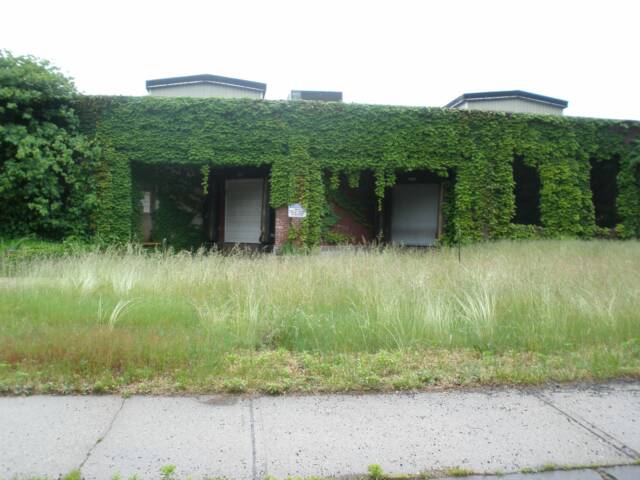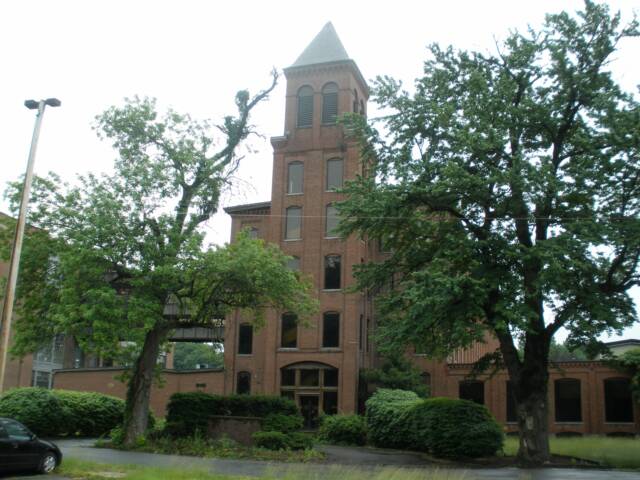The Colonial Press, Inc.
of Clinton, Massachusetts
Manufacturer of Three Investigators Books
Clinton - Colonial Press might not be the first mill that comes to people’s minds when they’re asked about the town’s rich manufacturing history. But few, if any, of Clinton’s mills meant more to the town, or can stir up emotions and nostalgia like Colonial Press, the company that made Clinton famous for books.
“We had an old neighbor, and every time he would talk about Colonial Press tears would just start welling up in his eyes and would pour down his cheeks,” said local historian Terry Ingano, who worked at the press when he was in high school. “We had a program here at the Holder Memorial a couple of years after Colonial Press closed and it was one of the best programs we’ve ever had. We had people sitting here crying because they hadn’t seen these people that they had worked with in years.”
Elaine Patterson started working at Colonial Press shortly after she graduated from business school in 1958 and was one of the last people out the door when it closed down in 1978.
“I worked there for 20 years, and I’d still be there today if it hadn’t closed,” Patterson said.
A new chapter
Founded in 1931 by Louis Adams, Colonial Press at one time was the largest book publisher on the East Coast, and at the pinnacle of its business was publishing about 58 million books a year.
Clinton’s publishing empire stretched from the building that formerly held the Wachusett Chamber of Commerce, down the length of Lancaster Mills, to the building Dunn & Co. currently occupies. Colonial Press also owned several buildings that have since been demolished, including a building that was located behind Lancaster Mills and stretched down to the banks of the Nashua.
Colonial Press had its own hospital, daycare, post office and the Colonial Press Inn, where employees could live.
“As long as you worked at Colonial Press, you could live at the Inn, but the minute you retired you had to leave,” Patterson recalled. “My supervisor decided to retire, and she had to get out of the Inn, and these were some pretty elegant places. Suddenly, through the simple act of retiring, she was out of her home.”
As well as printing both hardcover and paperback books, including encyclopedias, Colonial Press also published one of the most historically significant documents of the last century.
“One of the biggest books to come out of there was the Warren Commission Report,” Ingano said. “They were the first publishing company to get that out into the hands of the public. They got it out onto the streets in about a week. Carl Valerio, who worked there at the time, got into a truck and hauled them down to the bookstores in New York City. It was just this amazing feat.”
The press also served as the launching pad for another major player in the publishing world, David Dunn, who began working at Colonial Press as a third-shift laborer and eventually became vice president of product development.
Today, Dunn & Co. is the largest “book hospital” in the world and treats about 1 million books a month; fixing mistakes that may have occurred during the manufacturing process.
“There were a lot of things that the new owners weren’t willing to do,” Dunn said. “They didn’t do shrink wrap and they didn’t want to deal with pamphlets, and I saw this great opportunity to go after the business they were turning away.”
Eventually, Colonial Press expanded its industrial footprint by building a second publishing house on Adams Road, where Scholastic Books recently relocated.
Colonial Press also employed a huge number of families in and around Clinton.
“At one time it was the largest employer in town and had about 1,500 employees,” Dunn said. “They were a leader in technologies, and they gave their employees tremendous benefits; better than anything anyone is getting in Clinton today.”
Ingano, whose father also worked for the company, said Colonial Press was a place like no other when it came to jobs, and inspired a deep-seated loyalty among its employees.
“It was the best paying job in Clinton,” Ingano said. “When I was a junior in high school, I was working in shipping department and I was making $2.35 an hour, which was unheard of at the time.”
“When I started, I was going to be making $40 a week, which was a good pay, but when I was being interviewed for the job, because I had business school experience, they started me at $1.05 an hour,” Patterson said.
All photos on this page are courtesy of Three Investigators fan Brennan C. Gauthier who took these and many more photos of the remaining Colonial Press buildings in the spring of 2009. The accompanying article was originally published in The Times & Courier of Concord, MA.
If anyone visiting this page knows more about The Colonial Press and has specific memories regarding its role in the printing of the Alfred Hitchcock and the Three Investigators Mystery Series, please contact us!
Town's history is bound to Colonial Press
By Patrick Brodrick
Thu Aug 16, 2007, 12:13 PM EDT
No happy ending
What prompted Colonial Press to close its doors still remains a mystery to many, although Dunn said the demise could be linked to its sudden change to a corporate mentality.
“They were trying to publish books like they were building a car; like there were sprockets that just needed to go into a certain place,” Dunn said. “That’s not how books are made.”
“They called us into this meeting and the vice president stood up on this chair and told us that there was no truth to the rumors that Colonial Press was closing,” Patterson said. “The next week they announced they were closing. There was no reason, in terms of the company losing money, why they were closing. We were taking orders right up until the end. They just sold it to another company that didn’t care about a small town.”
The company that bought Colonial Press slowly went about the slow and arduous task of hollowing out the factory. Some of the machines were smashed and sold for scrap. Reams and reams of files were packaged up and shipped out to the new headquarters. Even the pipes for the sprinkler system were ripped out and sold for scrap.
Ingano’s father, who was there until the end, smuggled out some of Colonial Press’s history, like the small metal plates that were stamped onto each machine with the Colonial Press logo and the various signs for the Colonial Press Inn, which are now kept at the Holder Memorial, stored in glass cases like relics from a bygone era.
“It just wiped the town out, morally and financially,” Ingano said of the closing. “Some people moved away and followed jobs elsewhere, and I’m sure that there are some people that never recovered from Colonial Press closing. That was just the type of place it was, and it shows what it meant to this town.”
Back to HOME page.
Some of the loading docks as they appear in 2009.

